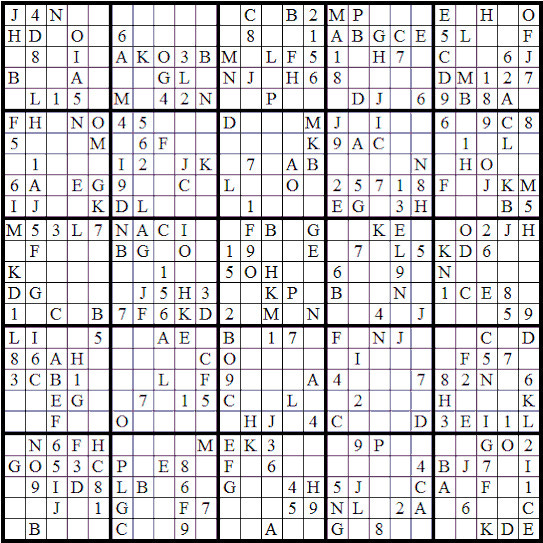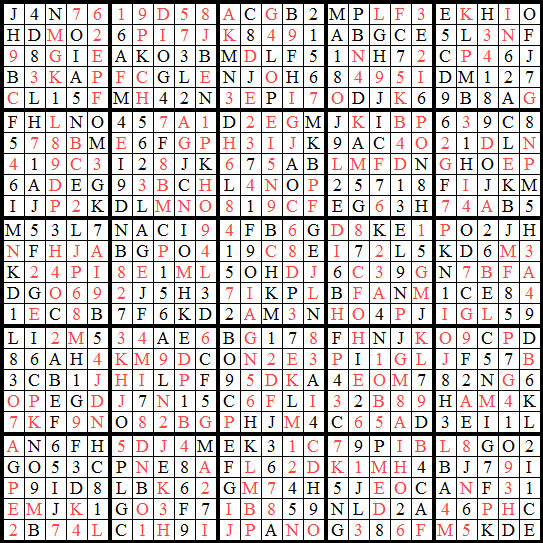Global determinism in a sudoku-like universe
Q/A with Emily Adlam.
I find Emily Adlam’s “Sudoku universe” picture VERY interesting and a game-changer for philosophy of physics. Adlam argues that the universe doesn’t compute itself locally in space and time, place by place and instant by instant, but all at once globally and self-consistently.
“The rules in Sudoko don’t start on the left of the grid and travel to the right - they apply to the entire grid at once,” Adlam explains to science writer Zeeya Merali. Adlam coined the term Sudoku universe because the laws of physics apply to everything - past, present and future - “all at once.”
Adlam suggests that “the laws of nature prescribe a unique course of history in the same way as a properly set up game of sudoku has a unique solution; the laws
of nature govern the whole course of history at once, rather than moment-by-moment, in the same way as the rules of the game of sudoku apply to the whole grid at once, rather than dictating the entries column by column.”
Solving a difficult Sudoku problem is hard, but if the problem is properly set up the solution is unique (deterministic). Similarly, if there is a unique solution for what can happen in space and time, then the universe is fully deterministic.


The term “determinism” is used in two different senses. One is that the past determines the future. Another is that the past alone does not determine the future, but there can be only one history anyway. Adlam’s perspective is deterministic in this second sense.
This helps make sense of free will and determinism as complementary aspects of reality. The universe is deterministic from an out-of-time perspective, but non-deterministic from an in-time perspective.
There’s still some tension with free will because, at the end of the day, you can do one and only one thing. But Christian theologians have lived with this tension for centuries. According to C. S. Lewis, God “simply sees you doing” what you will do tomorrow. See the excellent book “No One Like Him: The Doctrine of God” by John Feinberg for theological discussions. To me, the simplest way out is to think of ourselves as partly autonomous component of God, just like a software agent (aka bot) is a partly autonomous component of a larger program.
Adlam’s book “Foundations of Quantum Mechanics” (2021) doesn’t mention Sudoku but explains these things brilliantly. This book is very short, but less is more. Adlam covers philosophical aspects and interpretations of quantum physics, concisely outlining the technical aspects along the way.
According to Adlam, reality is nonlocal in both space and time. The course of history “is determined ‘all at once’ by external, atemporal laws of nature.”
“In such a theory, the result of a measurement at a given time can depend on global facts even if there is no record of those facts in the state of the world immediately prior to the measurement, and therefore events at different times can have a direct influence on one another without any mediation. Furthermore, an event at a given time will usually depend not only on events in the past but also on events in the future, so retrocausality emerges naturally within this global picture.”
Such a global theory would be based on “laws which apply to the whole of spacetime all at once.”
“In such a theory, events at a given time are certainly in some sense ‘caused’ by future events, since each part of the history is dependent on all other parts of the history...”
Retrocausality is not deterministic in the traditional past-determines-future sense, but it can be deterministic in this global sudoku sense.
Adlam notes that this global, or “holistic” formulation of determinism, is similar to Penrose’s “strong determinism.” As noted by Denis Noble, the idea can be traced back to Spinoza.
And of course the idea has been used in science fiction, notably by Ted Chiang in “Story of Your Life,” the novella upon which the film “Arrival” is based (of course the novella is better than the film). “This story grew out of my interest in the variational principles of physics,” said Chiang. With variational (Lagrangian) formulations of physics, explains Adlam, “we already have working examples” of globally deterministic, atemporal laws of nature.
The universe “works not ‘bottom-up’ but rather ‘top-down,’ with the laws of nature governing the whole of history at once,” argues Adlam in an essay that won the first prize in an FQXi essay contest on fundamental issues in physics. The laws of nature “apply simple macroscopic constraints to the universe as a whole and work out what needs to happen on a more fine-grained level in order to satisfy these constraints. Presumably at least some features will be left underdetermined by the global constraints…”
I read this as an opening to residual non-determinism, or to multiple worlds.
A “properly set up” sudoku problem has a unique solution, but perhaps cosmic sudoku must have multiple solutions to avoid having no solutions. If so, it seems to me that the universe must be a multiverse (better many worlds than no world). Adlam disagrees (see below).
Adlam was kind enough to reply to some questions I sent her:

Q/A with Emily Adlam
GP: In your book you say that “the course of history is determined ‘all at once’ by external, atemporal laws of nature.” In other words, the universe is deterministic from an out-of-time perspective, but appears non-deterministic from within time (a concept also found in Christian theology). My intuition tells me that this could be somehow related to Gödel (a consistent mathematical system appears incomplete from within the system). Do you agree? If so, can you put this more precisely?
EA: With respect to Godel - I hadn't thought about it! That's an interesting idea, I will have to reflect further on it.
GP: Are apparently random quantum outcomes (e.g. a post-decoherence “choices”) determined by global factors distributed all over space and time, including far away places and future times?
EA: They could be! (In particular, in many cases quantum outcomes do become deterministic if you add a future boundary condition - this is studied in the two state vector formalism). But I should say I don't know for sure or even necessarily believe firmly that the universe is globally deterministic, just that it could be.
GP: What about apparently random outcomes in non-quantum but chaotic dynamical systems?
EA: These outcomes are already deterministic from the fundamental point of view - they only appear random due to our lack of information.
GP: I find the counter-arguments of Nicolas Gisin persuasive.
EA: I do agree with Gisin's arguments, but I find this discussion a little bit academic because ultimately we don't live in a classical world, we live in a quantum one. Therefore it doesn't make much sense to me to speculate about what happens when you try to make classical physics infinitely precise - the answer is that you hit quantum mechanics when you go down to those scales.
GP: There are suggestions that our universe appears quantum precisely because of strongly fractal chaos.
EA: I do think that's a possibility, but the origins of quantum indeterminacy are quite a different topic to the origins of indeterminacy in classical chaos so I think the two topics should be addressed separately.
GP: In “Determinism Beyond Time Evolution” you say that “we could have free will in the context of some sorts of holistic determinism… our actions are determined by other events, but also those events are partly determined by our actions...” In other words, a holistic universe without me would be a different universe, and therefore I am a partly free agent in this holistic universe. This is a subtle concept of free will. Do you find it emotionally acceptable? If so, how would you try and persuade one who doesn’t?
EA: Well, I think that in the ordinary conception of reality (where everything is either random or determined by the initial state) there's definitely no sense in which we have free will. So even if this concept of free will is a little subtle, it's better than the alternative, which is no free will at all!
GP: In “Fundamental?” you say that the laws of nature “apply simple macroscopic constraints to the universe as a whole and work out what needs to happen on a more fine-grained level in order to satisfy these constraints.” I assume you have the laws of thermodynamics in mind as an example of macroscopic constraints. Could the macroscopic constraints include the emergence of complexity, life, consciousness, and some kind of “quality” (Robert Pirsig)?
EA: They could do! More or less anything one can imagine could be written in the form of a constraint, so the key problem is to come up with some criteria for how we should judge whether a putative constraint is really part of the objective structure of reality or whether it's just a higher-level description with no modal force of its own.
GP: You continue: “Presumably at least some features will be left underdetermined by the global constraints…” I read this as an opening to residual non-determinism, or to multiple worlds. A “properly set up” sudoku problem has a unique solution, but a sudoku problem can be overdetermined (no solution) or underdetermined (multiple solutions). Perhaps in cosmic sudoku there’s no unique-solution boundary between overdetermination and underdetermination, and therefore the universe must be a multiverse (better many worlds than no world). Do you agree? If so, could this be related to the multiverse concepts that have been proposed?
EA: I'm more inclined to say that if there are multiple solutions then one is selected at random, rather than there being multiple worlds. This is because the existence of multiple worlds leads to some very severe epistemic problems (I wrote about this in the context of the Everett interpretation here [link]. But of course I don't know for sure, since we will presumably never have direct evidence for or against multiple worlds.
GP: Have you seen the film Arrival or read the novella by Ted Chiang upon which it is based? There are some interesting parallels with your ideas.
EA: Yes, I definitely agree that Arrival and Story Of Your Life have ideas that parallel mine, and I often use them as examples. In fact, I met Ted Chiang this summer and discussed these topics with him!

